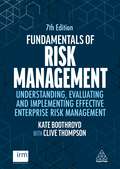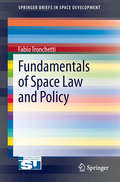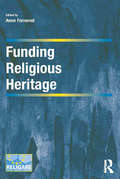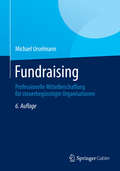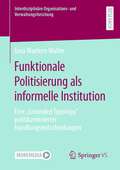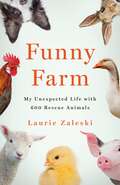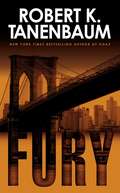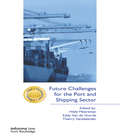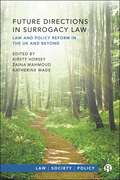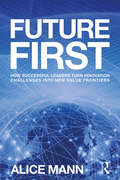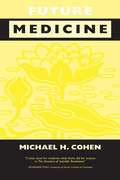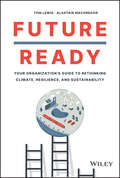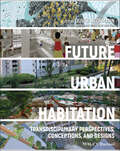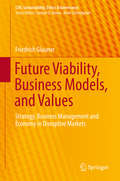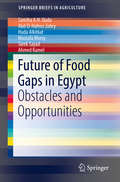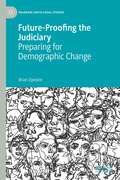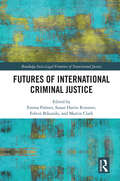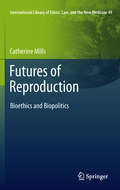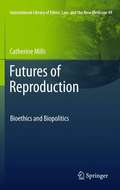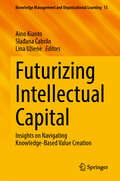- Table View
- List View
Fundamentals of Risk Management: Understanding, Evaluating and Implementing Effective Enterprise Risk Management
by Clive Thompson Kate BoothroydFundamentals of Risk Management provides a comprehensive introduction to enterprise risk for students and risk professionals, with tools and tips, expert insights and coverage of key developments in an ever-evolving field.Effective enterprise risk management allows organizations to maximize opportunities and minimize uncertainty. Aligned with ISO 31000, the COSO ERM Framework and the UK's Orange Book, this guide covers the key principles of risk management and how to deal with the different types of risk that organizations face. The frameworks of business continuity planning, enterprise risk management and project risk management are covered alongside an overview of international risk management standards and frameworks, strategy and policy. The text provides a clear introduction to a variety of risk management approaches used in sectors such as insurance, banking, law, health and safety and supply chain management.Now in its seventh edition, Fundamentals of Risk Management guides readers through the steps of risk identification, risk analysis, risk description and risk estimation. It includes new chapters covering emerging trends in risk management such as resilience, sustainability and strategic risk. It offers increased international coverage around corporate governance and real-world examples, allowing students to connect theory to practice. Supporting online resources include lecture slides with figures, tables and key points from the book.
Fundamentals of Roman Private Law
by George MousourakisRoman law forms a vital part of the intellectual background of many legal systems currently in force in Continental Europe, Latin America, East Asia and other parts of the world. Knowledge of Roman law, therefore, constitutes an essential component of a sound legal education as well as the education of the student of history. This book begins with a historical introduction, which traces the evolution of Roman law from the earliest period of Roman history up to and including Justinian's codification in the sixth century AD. Then follows an exposition of the principal institutions of Roman private law: the body of rules and principles relating to individuals in Roman society and regulating their personal and proprietary relationships. In this part of the book special attention is given to the Roman law of things, which forged the foundations for much of the modern law of property and obligations in European legal systems. Combining a law specialist's informed perspective with a historical and cultural focus, the book provides an accessible source of reference for students and researchers in many diverse fields of legal and historical learning.
Fundamentals of Space Law and Policy
by Fabio TronchettiPresents and addresses key space law and policy issues for the benefit of wider informed audiences that wish to acquaint themselves with the fundamentals of the space law field. This brief analyzes in a concise manner the combined influence of space law and policy on international space activities. Read in conjunction with the other books in the Springer 'Space Development' series, it supports a broader understanding of the business, economics, engineering, legal, and procedural aspects of space activities. This book will also give the casual reader as well as experts in the field insight on present and future space law and policy trends, challenges and opportunities.
Fundamentals of Trusts and Estates
by Roger W. Andersen Ira Mark BloomThe updated version of this innovative casebook contains numerous notes, questions, and problems that illuminate both the human and the doctrinal dramas, often by placing students in various roles. These problems and questions help students develop skills and values to carry throughout their professional lives. In addition, Fundamentals of Trusts and Estates includes excerpted readings, bibliographical references, sample documents, and provisions from Uniform Codes, Restatements, and other primary sources. Policy debates, ethical issues, and practical considerations are woven throughout the material.
Funding Religious Heritage (Cultural Diversity and Law in Association with RELIGARE)
by Anne FornerodThis collection brings together a group of highly respected law and religion scholars to explore the funding of religious heritage in the context of state support for religions. The importance of this state support is that on the one hand it illustrates the potential tensions between secular and religious values, whilst on the other it constitutes a relevant tool for investigating the question of the legitimacy of such financial support. The funding logically varies according to the national system of state-religion relationships and this is reflected in the range of countries studied, including: Belgium, Bulgaria, Denmark, France, Italy, The Netherlands, Spain, Turkey, and the United Kingdom. The book provides clarity in the assignment of funds to religious heritage, as well as seeking to define the limit of what relates to the exercise of worship and what belongs to cultural policy. It is clear that the main challenge for the future lies not only in managing the dual purpose of religious monuments, but also in re-using these buildings which have lost their original purpose. This collection will appeal to those interested in cultural heritage management, as well as law and religion scholars. The views expressed during the execution of the RELIGARE project, in whatever form and or by whatever medium, are the sole responsibility of the authors. The European Union is not liable for any use that may be made of the information contained therein.
Fundraising: Professionelle Mittelbeschaffung für steuerbegünstigte Organisationen
by Michael UrselmannDieses Buch liefert Ihnen einen systematischen Einstieg in professionelles Fundraising. Es basiert einerseits auf den neuesten wissenschaftlichen Erkenntnissen zu Nonprofit-Management und Fundraising. Andererseits baut es auf der jahrelangen Praxiserfahrung des Autors aus über achtzig Beratungsprojekten auf. Dank seiner didaktischen Erfahrung aus langjähriger Lehr-, Seminar- und Vortragstätigkeit gelingt es dem Autor, alle wichtigen Aspekte modernen Fundraisings übersichtlich und leicht verständlich darzustellen. Zahlreiche Beispiele, Abbildungen und Tabellen veranschaulichen praxisnah, wie Fundraising mithilfe von Planung, Controlling und Qualitätsmanagement zielorientiert gesteuert werden kann. Ein umfassender Service-Teil nennt Vertiefungsliteratur sowie Adressen von Fachverbänden und Dienstleistern in Deutschland, Österreich und der Schweiz. Auch für kleinere Organisationen werden zahlreiche Tipps und Empfehlungen gegeben.
Funktionale Politisierung als informelle Institution: Eine „Grounded Typology“ politikzentrierter Handlungsentscheidungen (Interdisziplinäre Organisations- und Verwaltungsforschung)
by Jana Marleen WalterEin Desiderat der Verwaltungsforschung betrifft die Frage, welchen Mechanismen politisch-responsives Verhalten unterliegt. Einerseits soll eine normgebundene öffentliche Verwaltung gewährleistet werden, zugleich soll sie die Umsetzung des politischen Willens garantieren. Anhand des Forschungsprojektes erfolgte die Hinwendung zur wissenschaftlich unterrepräsentierten ministeriellen Arbeitsebene. Mithilfe der „Grounded Typology“ ist ein qualitativ-rekonstruktives Verfahren gewählt worden, das einen innovativen Zugang zu funktionaler Politisierung ermöglicht. Anhand theoriegenerierender Expert:inneninterviews werden Beschäftigte des gehobenen und höheren Dienstes zu ihren Handlungsentscheidungen befragt, um zu beantworten, wie funktionale Politisierung in ihrer geistigen und materiellen Welt verankert ist. Erkennbar ist, dass funktionale Politisierung ein graduelles Konzept darstellt, das aus organisationaler Sozialisierung und einer motivationalen Komponente resultiert, wobei die Verhaltenserwartungen des politisch-administrativen Systems bekannt und beherrscht sein müssen und eine Motivation vorliegen muss, den politischen Willen zu erfüllen.
Funny Farm: My Unexpected Life with 600 Rescue Animals
by Laurie ZaleskiAn inspiring and moving memoir of the author's turbulent life with 600 rescue animals.Laurie Zaleski never aspired to run an animal rescue; that was her mother Annie’s dream. But from girlhood, Laurie was determined to make the dream come true. Thirty years later as a successful businesswoman, she did it, buying a 15-acre farm deep in the Pinelands of South Jersey. She was planning to relocate Annie and her caravan of ragtag rescues—horses and goats, dogs and cats, chickens and pigs—when Annie died, just two weeks before moving day. In her heartbreak, Laurie resolved to make her mother's dream her own. In 2001, she established the Funny Farm Animal Rescue outside Mays Landing, New Jersey. Today, she carries on Annie’s mission to save abused and neglected animals.Funny Farm is Laurie’s story: of promises kept, dreams fulfilled, and animals lost and found. It’s the story of Annie McNulty, who fled a nightmarish marriage with few skills, no money and no resources, dragging three kids behind her, and accumulating hundreds of cast-off animals on the way. And lastly, it's the story of the brave, incredible, and adorable animals that were rescued. Although there are some sad parts (as life always is), there are lots of laughs.
Fury
by Robert K. TanenbaumBestselling author Robert K. Tanenbaum astonishes readers with Fury, his most explosive book yet in the staggeringly popular Butch Karp/Marlene Ciampi series. In Brooklyn, a female jogger is brutally raped; the assailants are convicted and later exonerated by the Kings County DA. Now the guilty are filing a multimillion-dollar lawsuit against the city of New York, the police, and the two assistant DAs who tried the case. While the cops and the criminal justice system are under media assault and opportunist political demagoguery, Karp has suspicions that there is corruption within his own office. Against a backdrop of Russian mobsters and corrupt lawyers, Butch and Marlene are on a mission to restore the system's lost dignity and bring the rapists to justice. All the while terrorists are at it again, planning to blow the roof off Times Square on New Year's Eve. Alas, the Karp family finds itself in lethal jeopardy, and to survive, they must team up and fight their greatest battle yet. Robert K. Tanenbaum has written a mindboggling thriller involving a web of corruption and courtroom confrontations. Fans of Butch Karp, as well as the classic New York crime drama, will find plenty to sink their teeth into with Fury.
Fury (Butch Karp and Marlene Ciampi #17)
by Robert K. TanenbaumBestselling author Robert K. Tanenbaum astonishes readers with Fury, his most explosive book yet in the staggeringly popular Butch Karp/Marlene Ciampi series. In Brooklyn, a female jogger is brutally raped; the assailants are convicted and later exonerated by the Kings County DA. Now the guilty are filing a multimillion-dollar lawsuit against the city of New York, the police, and the two assistant DAs who tried the case. While the cops and the criminal justice system are under media assault and opportunist political demagoguery, Karp has suspicions that there is corruption within his own office. Against a backdrop of Russian mobsters and corrupt lawyers, Butch and Marlene are on a mission to restore the system's lost dignity and bring the rapists to justice. All the while terrorists are at it again, planning to blow the roof off Times Square on New Year's Eve. Alas, the Karp family finds itself in lethal jeopardy, and to survive, they must team up and fight their greatest battle yet. Robert K. Tanenbaum has written a mindboggling thriller involving a web of corruption and courtroom confrontations. Fans of Butch Karp, as well as the classic New York crime drama, will find plenty to sink their teeth into with Fury.
Future Challenges for the Port and Shipping Sector (The Grammenos Library)
by Hilde Meersman Thierry Vanelslander Eddy Van De VoordeFuture Challenges for the Port and Shipping Sector discusses the issues that most influence the future of the maritime and port industries. Important topics covered in this book include: Maritime trade, future trade flows, evolutions in international trade, shipping capacity and demand Developments in ship construction and their economic consequences Future developments in ports: technology and economics The future role of port authorities The future development in ports Financial developments This book looks at shipping from an holistic point of view and will be especially compelling in these challenging times.
Future Directions in Surrogacy Law: Law and Policy Reform in the UK and Beyond (Law, Society, Policy)
by Kirsty Horsey, Zaina Mahmoud and Katherine WadeThis edited collection brings together a range of experts on surrogacy, at a time when the law in the UK has been fully reconsidered for the first time in generations. Society has developed significantly since surrogacy laws were first written and the existing law is out of date and no longer fit for purpose. Each chapter in this collection considers one aspect of surrogacy regulation and analyses the potential effectiveness of proposed reforms or suggests what changes should be made based on experience in other jurisdictions. This is an unprecedented contribution to the public and regulatory debate on surrogacy.
Future First: How Successful Leaders Turn Innovation Challenges into New Value Frontiers
by Alice MannFuture First is a practical guide for any business leader who wants to build, expand, or reinvent their company by finding new value in global challenges. Traditional companies often view issues like income equality, global warming, and resource scarcity as "problems." By contrast, future first leaders understand them as opportunities, as innovation challenges. Through real-life business examples ranging from Nike to Opower, this book lays out how to identify and adopt the future first leadership mindset and business capabilities required to achieve lasting and integrated performance results. Future First examines how leaders from companies including Unilever, Etsy, Revolution Foods, Method Products, and others have adopted this mindset toward innovation and people practices, accelerating business ecosystem transformation. Alice Mann, an organizational psychologist with twenty years of experience consulting and coaching on executive leadership, organization design, and business transformation, interviewed scores of business leaders to understand how their companies are expanding into new value frontiers. Future First makes a convincing argument that successful partnerships and alliances among big global companies and small mission-driven ones can reshape the global ecosystems of apparel, food, automobiles, and energy, and remake the future of our world.
Future Forsaken: Abuses Against Children Affected by HIV/AIDS in India
by Human Rights WatchThis 209-page report documents how many doctors refuse to treat or even touch HIV-positive children. Some schools expel or segregate children because they or their parents are HIV-positive. Many orphanages and other residential institutions reject HIV-positive children or deny that they house them. Children from families affected by AIDS may be denied an education, pushed onto the street, forced into the worst forms of child labor, or otherwise exploited, all of which puts them at greater risk of contracting HIV.
Future Medicine: Ethical Dilemmas, Regulatory Challenges, and Therapeutic Pathways to Health Care and Healing in Human Transformation
by Michael H. CohenFuture Medicineis an investigation into the clinical, legal, ethical, and regulatory changes occurring in our health care system as a result of the developing field of Complimentary and Alternative Medicine (CAM). Here Michael H. Cohen describes the likely evolution of the legal system and the health care system at the crossroads of developments in the way human beings care for body, mind, emotions, environment, and soul. Through the use of fascinating and relevant case studies, Cohen presents stimulating questions that will challenge academics, intellectuals, and all those interested in the future of health care. In concise, evocative strokes, the book lays the foundation for a novel synthesis of ideas from such diverse disciplines as transpersonal psychology, political philosophy, and bioethics. Providing an exploration of regulatory conundrums faced by many healing professionals, Cohen articulates the value of expanding our concept of health care regulation to consider not only goals of fraud control and quality assurance, but also health care freedom, integration of global medicine, and human transformation. Future Medicineprovides a fair-minded, illuminating, and honest discussion that will interest hospice workers, pastoral counselors, and psychotherapists, as well as bioethicists, physicians and allied health care providers, complementary and alternative medical providers (such as chiropractors, acupuncturists, naturopaths, massage therapists, homeopaths, and herbalists), and attorneys, hospital administrators, health care executives, and government health care workers. Michael H. Cohen is Director for Legal Programs, the Center for Research and Education in Complementary and Integrative Medical Therapies, Beth Israel Deaconess Medical Center, Harvard Medical School.
Future Ready: Your Organization's Guide to Rethinking Climate, Resilience, and Sustainability
by Tom Lewis Alastair MacGregorRethink climate, resilience, and sustainability for your organization In Future Ready: Your Organization’s Guide to Rethinking Climate, Resilience, and Sustainability, a team of business leaders with deep expertise in engineering, planning, finance, project, program implementation and advisory consulting perspective delivers an essential guide for executives, managers, and other business and infrastructure organization leaders to set and implement a resilience, sustainability and ESG strategy in complex project and operating environments. Through practical examples and proven insights, readers will learn to proactively engage with stakeholders, successfully plan, implement, and measure the impacts of their initiatives, and effectively communicate the results. In the book, the authors draw on hundreds of completed projects across a full range of client organizations, markets, sectors, and scales to equip readers with unprecedented insights and the behind-the-scenes work that went into making the projects successful. The authors also include: Strategies for identifying, cataloguing, and reporting risks—from the operational to the physical and transactional—as well as explanations of how climate risk scenarios can reveal hidden opportunities and unexpected vulnerabilities A Future Ready mindset and the specific examples of organizational sustainability and climate adaptation commitments and the paths companies have taken to meet their goals Critical questions that leaders must ask of themselves and their organizations before they begin a climate, resilience, and/or sustainability initiativeA must-read guide for executives, board members, ESG professionals, and other business and infrastructure organization leaders, Future Ready belongs in the hands of anyone who finds themselves responsible for helping an organization achieve their environmental, social, and governance goals.
Future Urban Habitation: Transdisciplinary Perspectives, Conceptions, and Designs
by Oliver HeckmannPresents forward-looking concepts, innovative research, and transdisciplinary perspectives for developing strategies for future urban habitation Around the globe, urban populations are growing at an unpreceded rate, in particular in Asia and Africa. In view of pressing social and environmental challenges it is essential to reimagine current design strategies to build affordable, sustainable, and inclusive communities that can respond to future demographic dynamics, new social practices, and the consequences of climate change. Future Urban Habitation presents an integrative, transdisciplinary approach for developing long-term strategies for urban housing at a different scales. With focus on the rapidly growing cities of Asia, and urban processes in Europe and North-America this volume offers perspectives from both researchers and practitioners involved in multiple aspects of urban habitation. The authors address a range of challenges to urban habitation with four intersecting thematic frameworks: Inclusive Urbanism, High-Dense Typologies for Building Community, Adaptable and Responsive Habitation, and New Tools and Approaches. Throughout the text, readers are presented with innovative design ideas from different fields, new concepts for social practices and sustainable housing policies, recent research on urban housing, and more. Exploring both social and architectural strategies for sustainable and livable dwelling models, Future Urban Hanitation: Addresses challenges associated with urbanization, population growth, societal segregation, shifting demographics and the crisis of care, and climate change Discusses advanced approaches for design thinking and design research and the impact of inclusive people-centric social design Explores the building of collaboration-based, cohesive neighborhoods and community-based social and health services Describes the use of innovative tools and methods affecting design practices and decision-making processes, such as co-design, social design, parametric design, performance simulation and sustainable construction to develop urban housing Includes perspectives and concepts from policy makers in housing boards and social service administrations, urban planners, architectural and social designers, innovators in sustainable construction, and researchers working on urban society Future Urban Habitation is an invaluable resource for designers from various fields including architecture, urban planning, and social design, for researchers from social science and design fields, and for policymakers, and other practitioners working on the provision of housing and the facilitation of social services in urban environments.
Future Viability, Business Models, and Values
by Friedrich GlaunerThis book challenges the traditional models of modern economy, business education and management, which are devoted to the concepts of scarcity, competition, growth and yield. It deconstructs the spiral of acceleration in which technological shifts concerning global markets and enterprises produce a dynamic of unbridled disruption, concentration and erosion of human and natural resources. The book analyzes how, in the face of this dynamic, once successful business models increasingly lead to existential jeopardy. The book embeds its argument in the impact of technological change on strategy in general. It subsequently analyzes the degree of rationality in the strategy building process to juxtapose revenue and responsibility as the fundamental principles of diverging strategic concepts. In its central chapters the book explores the benefits of consciousness-driven business models and value-added strategies for the awareness markets of the future and their impact on team excellence and resource handling. It develops an understanding of how corporations can function as ecosystems fostering the growth and development of the resources they operate on, rather than being based on their exploitation. Understanding this structure of viable future business models is the overall theme of this pioneering book. " This book endeavors to set out yet another paradigm for a viable economics, the paradigm of ethicology. It seeks to replace the concepts of competition, scarcity and growth with strategies and business models based on resource creation, added values cycles, enrichment and symbiosis in line with the awareness economy it describes. "Hunter Lovins, President and Founder of Natural Capitalism Solutions " . . . a very basic paradigm shift in our future strategies " Henner Klein, Chairman Emeritus A. T. Kearney " The book stands right on the tectonic fault line between our old and our new reality. It manages to do both: analyze the shifting paradigms and provoke new thinking. " Dr. Martin R. Stuchtey, Director of the McKinsey Center for Business & Environment " This book is raising the bar. His vision dares to rethink the principles of the liberal and social market economy in a globalized business world. " Prof. Dr. Rene Schmidpeter, CBS Koln " A book worth reading and reflecting on. Onwards to an economy that works for 100% of humanity. " Michael Pirson, Associate Professor, Director Center for Humanistic Management, Fordham University and Research Fellow, Harvard University " powerful arguments and practical guidance on how companies can become sustainable and live up to the realities of global enterprise " Michael Hilti, Hilti AG " " "
Future Viability, Business Models, and Values: Strategy, Business Management and Economy in Disruptive Markets (CSR, Sustainability, Ethics & Governance)
by Friedrich GlaunerThis book challenges the traditional models of modern economy, business education and management, which are devoted to the concepts of scarcity, competition, growth and yield. It deconstructs the spiral of acceleration in which technological shifts concerning global markets and enterprises produce a dynamic of unbridled disruption, concentration and erosion of human and natural resources. The book analyzes how, in the face of this dynamic, once successful business models increasingly lead to existential jeopardy.The book embeds its argument in the impact of technological change on strategy in general. It subsequently analyzes the degree of rationality in the strategy building process to juxtapose revenue and responsibility as the fundamental principles of diverging strategic concepts. In its central chapters the book explores the benefits of consciousness-driven business models and value-added strategies for the awareness markets of the future and their impact on team excellence and resource handling. It develops an understanding of how corporations can function as ecosystems – fostering the growth and development of the resources they operate on, rather than being based on their exploitation. Understanding this structure of viable future business models is the overall theme of this pioneering book.“This book endeavors to set out yet another paradigm for a viable economics, the paradigm of ethicology. It seeks to replace the concepts of competition, scarcity and growth with strategies and business models based on resource creation, added values cycles, enrichment and symbiosis in line with the awareness economy it describes.” Hunter Lovins,President and Founder of Natural Capitalism Solutions “... a very basic paradigm shift in our future strategies …” Henner Klein, Chairman Emeritus A.T. Kearney “The book stands right on the tectonic fault line between our old and our new reality. It manages to do both: analyze the shifting paradigms and provoke new thinking.” Dr. Martin R. Stuchtey, Director of the McKinsey Center for Business & Environment “This book is raising the bar. His vision dares to rethink the principles of the liberal and social market economy in a globalized business world.” Prof. Dr. René Schmidpeter, CBS Köln “A book worth reading and reflecting on. Onwards to an economy that works for 100% of humanity.” Michael Pirson,Associate Professor, Director Center for Humanistic Management, Fordham University and Research Fellow, Harvard University „ … powerful arguments and practical guidance on how companies can become sustainable and live up to the realities of global enterprise …” Michael Hilti, Hilti AG
Future of Food Gaps in Egypt
by Abd El-Hafeez Zohry Samiha A. H. Ouda Huda Alkitkat Mostafa Morsy Tarek Sayad Ahmed KamelThis work gives a multidisciplinary approach to assess and provide solutions to improve food security in Egypt. It has specific chapters on projection of climate change using IPCC AR5 models and regional climate model, and a chapter on population projection in 2030. This book aimed at research, graduate/post graduate students and policy makers. It can also be used by overpopulated countries to solve their own food gap problems.
Future-Proofing the Judiciary: Preparing for Demographic Change (Palgrave Socio-Legal Studies)
by Brian OpeskinThis book reinvigorates the field of socio-legal inquiry examining the relationship between law and demography. Originally conceived as 'population law' in the 1960s following a growth in population and a use of law to temper population growth, this book takes a new approach by examining how population change can affect the legal system, rather than the converse. It analyses the impact of demographic change on the judicial system, with a geographic focus on Australian courts but with global insights and it raises questions about institutional structures. Through four case studies, it examines how demographic change impacts on the judicial system and how should the judicial system adapt to embody a greater preparedness for the demographic changes that lie ahead? It makes recommendations for reform and speaks to applied demographers, socio-legal scholars, and those interested in judicial institutions.
Futures of International Criminal Justice (Routledge Socio-Legal Frontiers of Transitional Justice)
by Martin Clark Emma Palmer Edwin Bikundo Susan Harris RimmerThis collection identifies and discusses problems and opportunities for the theory and practice of international criminal justice. The International Criminal Court and project of prosecuting international atrocity crimes have faced multiple challenges and critiques. In recent times, these have included changes in technology, the conduct of armed conflict, the environment, and geopolitics. The mostly emerging contributors to this collection draw on diverse socio-legal research frameworks to discuss proposals for the futures of international criminal justice. These include addressing accountability gaps and under-examined or emerging areas of criminality at, but also beyond, the International Criminal Court, especially related to technology and the environment. The book discusses the tensions between universalism and localisation, as well as the regionalisation of international criminal justice and how these approaches might adapt to dynamic organisational, political and social structures, at the ICC and beyond. The book will be of interest to students, researchers and academics. It will also be a useful resource for civil society representatives including justice advocates, diplomats and other government officials and policy-makers.
Futures of Reproduction
by Catherine MillsIssues in reproductive ethics, such as the capacity of parents to 'choose children', present challenges to philosophical ideas of freedom, responsibility and harm. This book responds to these challenges by proposing a new framework for thinking about the ethics of reproduction that emphasizes the ways that social norms affect decisions about who is born. The book provides clear and thorough discussions of some of the dominant problems in reproductive ethics - human enhancement and the notion of the normal, reproductive liberty and procreative beneficence, the principle of harm and discrimination against disability - while also proposing new ways of addressing these. The author draws upon the work of Michel Foucault, especially his discussions of biopolitics and norms, and later work on ethics, alongside feminist theorists of embodiment to argue for a new bioethics that is responsive to social norms, human vulnerability and the relational context of freedom and responsibility. This is done through compelling discussions of new technologies and practices, including the debate on liberal eugenics and human enhancement, the deliberate selection of disabilities, PGD and obstetric ultrasound.
Futures of Reproduction: Bioethics and Biopolitics
by Catherine MillsIssues in reproductive ethics, such as the capacity of parents to 'choose children', present challenges to philosophical ideas of freedom, responsibility and harm. This book responds to these challenges by proposing a new framework for thinking about the ethics of reproduction that emphasizes the ways that social norms affect decisions about who is born. The book provides clear and thorough discussions of some of the dominant problems in reproductive ethics - human enhancement and the notion of the normal, reproductive liberty and procreative beneficence, the principle of harm and discrimination against disability - while also proposing new ways of addressing these. The author draws upon the work of Michel Foucault, especially his discussions of biopolitics and norms, and later work on ethics, alongside feminist theorists of embodiment to argue for a new bioethics that is responsive to social norms, human vulnerability and the relational context of freedom and responsibility. This is done through compelling discussions of new technologies and practices, including the debate on liberal eugenics and human enhancement, the deliberate selection of disabilities, PGD and obstetric ultrasound.
Futurizing Intellectual Capital: Insights on Navigating Knowledge-Based Value Creation (Knowledge Management and Organizational Learning #15)
by Aino Kianto Slađana Čabrilo Lina UžienėThis book collects the ground-breaking ideas of top IC scholars on how to futurize IC theory and practice. Keeping the future in focus and searching for answers to fundamental questions related to the development of IC theory and practice that foster sustainability and societal wellbeing, this book provides new insights and perspectives concerning the nature and scope of IC, its effective management mechanisms, and the potential impact of IC on organizations and societies. The carefully curated 16 chapters by leading thinkers in the field address the key areas of future-proof IC research and practice: the complex and dynamic nature of IC, the role of IC in social ecosystems and its potential in facilitating smart social growth, the dynamic interplay between artificial intelligence and IC, and alternative paradigms for optimizing the transformative power of IC while prioritizing sustainability, social equity, and holistic wellbeing. The book inspires new thinking by breaking old thought patterns, making new connections, and generating fresh perspectives on IC. Serving as a catalyst for future global dialogue, the book guides scholars and practitioners on how to align IC theory and practices with future economic, social, and technological changes, inspires experimentation, and opens up new perspectives for the development of IC theory and practice that should contribute to the global societal transformation, sustainable growth, and peace.
